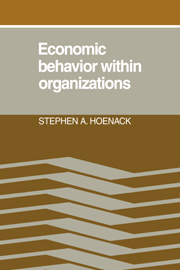Book contents
- Frontmatter
- Contents
- Preface
- 1 Introduction
- 2 Definitions and determinants of employees' discretion over an organization's resources and production
- 3 Employees' resource diversions and employers' imposition of resource responsibility
- 4 Short-run resource allocation under fixed budgets
- 5 Short-run resource allocation in response to demand: the cases of an employee, a private corporation, and a private nonprofit organization
- 6 Legislative demand and short-run price and output of the public organization
- 7 Employees' investment behavior and implications for suborganization
- 8 Equilibrium behavior of public and private organizations in the first long run
- 9 The demand and supply of nonmarket resource allocation
- 10 A brief summary and proposed directions for further work
- Notes
- References
- Core definitions
- Index
6 - Legislative demand and short-run price and output of the public organization
Published online by Cambridge University Press: 05 November 2011
- Frontmatter
- Contents
- Preface
- 1 Introduction
- 2 Definitions and determinants of employees' discretion over an organization's resources and production
- 3 Employees' resource diversions and employers' imposition of resource responsibility
- 4 Short-run resource allocation under fixed budgets
- 5 Short-run resource allocation in response to demand: the cases of an employee, a private corporation, and a private nonprofit organization
- 6 Legislative demand and short-run price and output of the public organization
- 7 Employees' investment behavior and implications for suborganization
- 8 Equilibrium behavior of public and private organizations in the first long run
- 9 The demand and supply of nonmarket resource allocation
- 10 A brief summary and proposed directions for further work
- Notes
- References
- Core definitions
- Index
Summary
Although the behavioral postulates underlying demands of private citizens for an organization's outputs are well established, the analogous demand of a legislature cannot be derived from existing theory. Therefore, before analyzing short-run price, income, and output determination for a public organization, it is necessary to consider how a number of important contributions in the political science and public choice literatures can be extended in order to derive a legislature's demand function for a good or service. This analysis also enables us to determine the role of a legislature as the funding authority of a public organization.
An analysis of legislative behavior may seem a detour in a book about economic behavior within organizations, but a legislature is an organization whose funding authority consists of citizens eligible to vote. These citizens' willingness to provide funds to a legislature depends in part on the welfare they derive from public goods, although legislatures find it in their interest also to provide private goods. The analysis will determine the allowable resource diversions that derive from a legislature's capability to tax citizens and then provide economic benefits to them, as well as establish the shares of these resource diversions that go to legislators and to employees in organizations supplying legislative demands. Legislators face costs of negotiating with each other as do employees in other types of organizations.
- Type
- Chapter
- Information
- Economic Behaviour within Organizations , pp. 140 - 172Publisher: Cambridge University PressPrint publication year: 1983



